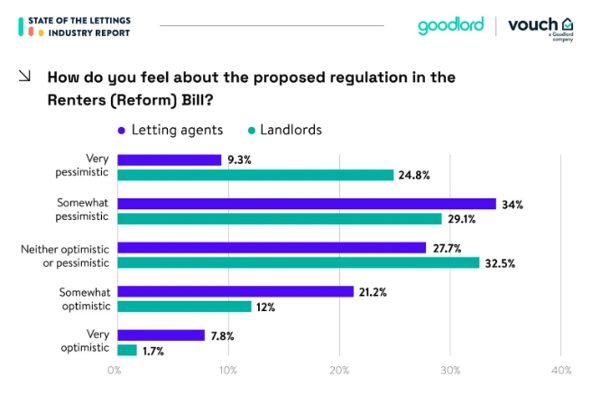The Renters (Reform) Bill 2023 is a piece of proposed legislation with potentially significant results for the private rental sector. It’s one of the biggest proposals for tenant rights and landlord powers in recent history.
With its size and potential impact in mind, the proposal has received mixed feedback from both sides. In this blog, we look at the bill's details, what it means for landlords and how you can prepare should the bill become law.
What does the Renters Reform Bill stand for?
The Renters Reform Bill is primarily in place to abolish the assured shorthold tenancies (ASTs) introduced as standard as part of the Housing Act 1988.
ASTs means that currently, private landlords can evict tenants without having an established fault or reason, leading to insecurity for tenants. The Renters Reform Bill seeks to abolish these tenancies to enhance security for tenants and the ability to exercise their rights.
The bill also includes guidelines for annual rent increases to avoid unaffordable and unjust decisions that could leave tenants unexpectedly homeless.
The official outline of the bill includes:
- Abolish assured shorthold tenants and section 21 ‘no fault’ evictions.
- Repossession grounds will be amended, making it easier for landlords to repossess properties where anti-social behaviour and rent arrears are an issue.
- Implement a process for annual rent increases. First-tier tribunals determine market rates if a tenant appeals against a proposed increase.
- A new independent Ombudsman will be established for the private rental sector.
- A new portal will be created for tenants, landlords and local authorities to access shared, essential information.
- Landlords can’t refuse a tenant’s request to keep a pet without reasonable grounds.
It’s important to note that the bill is still at the drafting stage and will likely be amended before it becomes statutory legislation.
What is the impact of the Renters Reform Bill on landlords?
The bill has received mixed feedback from landlords since being proposed. While tenants feel the bill needs to go further, some private landlords think it's too restrictive.
According to Goodlord and Vouch’s State of the Lettings Industry Report 2023, 25% of landlords feel ‘very pessimistic’ and 29% feel ‘somewhat pessimistic’ about the bill.

Source: Goodlord
Landlords are understandably nervous as there are likely to be more stringent processes and controls in place, which could work against them in extenuating circumstances.
The changes to rental raises could be negative for landlords, as it reduces your control over your properties. However, as long as the rent remains in accordance with the market price, this shouldn’t be a problem.
However, the bill does propose some positives for landlords. For example, the independent Ombudsman and online portal will help increase information sharing, transparency and compliance within the sector.
What should landlords do to prepare?
While the bill is still passing through parliament, there's no need to make any immediate changes as conditions will likely be amended. The bill will likely become law between 2024 and 2025, usually six months after Royal Assent is granted.
However, it’s never too early to prepare for such significant changes potentially coming into force.
Reviewing your property portfolio and any tenancies to establish where relationships currently stand is advisable. Some tenancies may need to be looked at and discussed ahead of these changes.
Compliance is also a big part of the Renters Reform Bill puzzle. Having all the correct documentation will be more critical than ever, so a focus on compliance processes is essential.
So, why is compliance so important? Under the proposed bill, landlords must have all the appropriate tenancy housekeeping documents to obtain vacant possession.
This could mean that a simple compliance documentation mistake could prevent you from obtaining possession of your property. Investing in the right compliance procedures and software will mitigate this risk.
Keep on top of property compliance
Maintaining property portfolio compliance has never been easier thanks to CheckDocs. The innovative, intuitive software uses automation and data analytics to ensure property compliance and safeguard your business. To find out more, click the link below.
